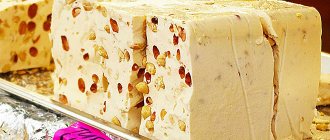Every nursing woman takes care of her diet, which should be varied and nutritious. At the same time, not all products are allowed, as a result of which certain restrictions on the diet during lactation are noted. Despite certain dietary restrictions, many young mothers want to give themselves some indulgences.
Useful properties of eggs
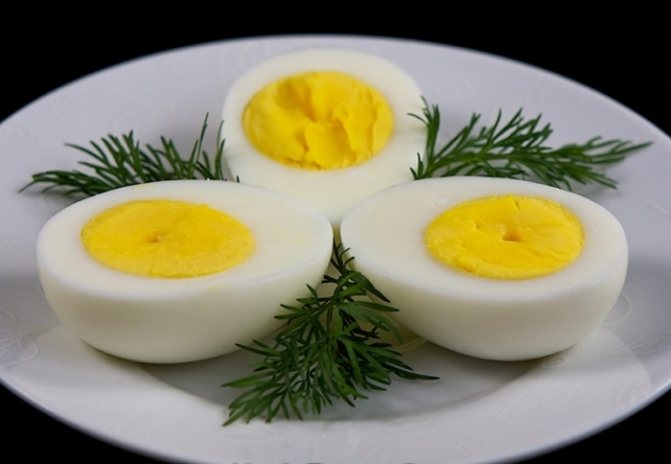
Eggs are a popular product. But few people know about their benefits:
- They are a source of easily digestible protein;
- Contains vitamin D, necessary for strengthening bones;
- The yolk contains lecithin - normalizes the functioning of the liver and brain;
- They are 98 percent absorbed by the body;
- Helps strengthen vision and prevent cataracts, thanks to luten;
- Recommended for the prevention of cancer;
- Regulate blood formation;
- Eliminates negative environmental impacts;
- Contains folic acid;
- Rich in microelements and amino acids. The composition includes magnesium, phosphorus, iron, calcium, manganese;
- The shell is no less useful; it contains a large amount of calcium and about 30 other microelements.
The benefits of eggs during lactation
The question of whether you can eat eggs while breastfeeding is quite logical, since they are included in many products - baked goods, pasta, sauces.
The benefits for a nursing mother during breastfeeding are as follows:
- Source of protein;
- Low calorie content;
- Large percentage of water;
- Leadership in the presence of vitamins (B2, B4, B5, B9, A, B12, H);
- Rich composition of microelements (phosphorus, magnesium, iron, calcium).

Eggs are a source of protein
Chicken eggs for breastfeeding
Chicken eggs should not be completely excluded from the diet when breastfeeding, as they have a number of beneficial properties for mother and baby:
- Cleanse the body of toxins;
- Stimulate brain activity;
- Help overcome fatigue;
- Stimulates liver function;
- Promote postpartum recovery;
- By removing toxins, they improve skin condition;
- The composition of the yolk prevents aging;
- A chicken egg fills 15% of a mother's daily protein requirement.
Due to the presence of the above properties, the question of whether chicken eggs can be eaten while breastfeeding is given a positive answer.
Quail eggs for breastfeeding

Quail eggs
The use of quail eggs during breastfeeding, when compared with chicken eggs, has special important qualities:
- This is a more dietary product;
- Absorbed faster;
- Promote rapid recovery after childbirth, thanks to vitamins A and B;
- Strengthen immunity;
- Improves the functioning of the digestive system;
- Helps strengthen blood vessels;
- Activate brain activity.
On a note! In general, eating quail eggs is more beneficial than chicken eggs. If the baby does not react, it is recommended to use them during breastfeeding.
How to properly introduce eggs into the diet of a nursing woman?
There is no point in depriving yourself and your child of such valuable nutritional components.
You just need to remember the recommendations developed by pediatricians:
- For the first month we abstain from everything except eggshells. You should not use eggs even for making baked goods. From the second month you can already add eggs to dishes as an additional ingredient, but only if their taste is not even distinguishable.
- From 3-4 months we introduce yolk to the menu. We start with a third of the ball, gradually increasing the daily dose to the whole sphere. From six months we also include protein.
- A nursing mother is allowed to eat no more than 2 chicken and 3-4 quail eggs per week.
- The optimal option for serving the product is soft-boiled. If you keep less, there is a risk of not destroying all pathogens. If you overexpose it, almost all useful components will be destroyed, and the product itself will be absorbed by the digestive system with great difficulty.
If the baby is prone to a violent reaction to the introduction of new foods into the mother’s diet, then the transition to a diet that includes eggs should be agreed upon with the pediatrician. In some cases, the mother has to refuse the component for the entire time of breastfeeding.
The diet of a nursing mother should be balanced in terms of healthy ingredients and calories. The introduction of eggs into complementary foods during breastfeeding is a controversial issue. The opinions of nutritionists and pediatricians do not find common ground. The decision must be made by the woman based on her own well-being and the health of the infant.
Eggs are an easily digestible dietary product. Egg white contains protein, water, minerals and carbohydrates. The yolk contains water, fats, proteins, and microelements.
The benefits of the product are explained by the presence of components that affect metabolic processes in the body:
- phosphorus and calcium - on the condition of bone tissue, including nails and hair;
- potassium - on metabolism, activity of the cardiovascular system;
- zinc strengthens the immune system;
- selenium is an antioxidant, affects skin regeneration;
- B vitamins determine the functioning of the nervous, immune, hematopoietic, and hormonal systems;
- nicotinic acid (NA) regulates metabolic processes and the level of “bad” cholesterol;
- tocopherol (E) normalizes hormonal levels;
- retinol (A) is necessary for cellular metabolism and immunity;
- HDL cholesterol cleanses blood vessels and is required for the formation of steroid and corticosteroid hormones and vitamin D;
- amino acids belong to the group of essential (10 names) and are not produced in the body.
Raw eggs are less digestible than hard-boiled eggs. For dietary nutrition, it is possible to eat protein and yolk separately.
Kurinykh
An egg weighing 50-60 grams consists of 70% water, contains proteins and fats in almost equal proportions (10-12% each), minerals - 1%, carbohydrates - less than 1%. Liquid yolk occupies a third of the volume of the raw product. Two yolks a day cover the body's daily need for cholesterol.
The daily dose of vitamin A for women is 700 micrograms. To satisfy the body's need for a catalyst for metabolic processes, such as retinol, you will need 1 chicken egg.
Of the list of essential amino acids, the largest percentage are:
- isoleucine;
- leucine;
- valine;
- lysine;
- arginine
The role of isoleucine, leucine is to regulate blood sugar levels, produce hemoglobin, and restore damaged tissues. The amino acid valine is necessary for liver function and muscle strengthening.
Arginine affects blood glucose levels, improves immunity, and helps cleanse the body of toxins. Regular consumption helps improve performance and stability of the immune system, strengthens blood vessels and bone tissue. The calorie content of a medium-sized product is 70 kilocalories.
Quails
A quail egg is 3 times smaller in volume and 5-7 times lighter than a chicken egg. It has a similar composition, but is superior in some components:
- for vitamin A – 1.5;
- vitamins B1, B2 – 2;
- potassium – in 5;
- gland – 3.5 times.

Phosphorus predominates among microelements in chicken, while potassium predominates in quail. The composition of amino acids also differs: threonine, tyrosine, glycine, and histidine predominate. Quails are effective in treating the liver, pancreas, gastrointestinal tract, anemia, dystrophy, pneumonia, glaucoma. They help with headaches and low immunity. The energy content of 1 piece is 19 kilocalories.
Possible harm to eggs during breastfeeding
The harm of eating eggs during breastfeeding lies in their high allergenicity.
The fact is that egg white is 50 times more allergenic than yolk. If it is consumed during lactation, the baby may develop hives. Over time, it develops into a more severe form of the reaction. If a child experiences such symptoms, the product should be immediately removed from the diet. As well as the food in which it is used.
Allergies can manifest themselves in:
- Edema;
- Hives;
- Eczema;
- Nausea;
- Stomach upset;
- Bronchial asthma.
Some egg producers use antibiotics to improve chicken health. But such substances can worsen the microflora of the mother’s body.
The way you cook the eggs often plays a role. Intensive frying using large amounts of oil produces cholesterol, which blocks blood vessels and contributes to the development of plaques.
Eggs contain nitrates, their amount exceeds that in fruits and vegetables.

Eggs can cause hives in babies
Are eggs allowed during lactation?
The debate about whether it is permissible to eat bird eggs during breastfeeding continues to this day. Some doctors and consultants argue that this product should be removed from the menu for a long time, others point to the balanced composition, the abundance of vitamins and minerals necessary for a young mother.
Dates and quantities
In the first months after the baby is born, a nursing mother must be careful when introducing foods into her diet that can cause allergies in the child.
- It is better not to take risks with the health of the newborn, so many women exclude eggs and any food based on them, including baked goods, from the menu during the first month of the baby’s life.
- In the second month, the young mother can eat the yolk. At first, you should eat no more than a third of the chicken product (or a whole quail core).
- By the end of the second month of breastfeeding, you are allowed to consume a whole chicken yolk daily.
- In the third month of a baby’s life, the mother can eat yolk and white, somewhat limiting the amount of egg products in her diet.
How to recognize allergies in a child
Egg white is a strong allergen. In young children, the intolerance reaction usually manifests itself as atopic dermatitis or indigestion. In severe cases, Quincke's edema and bronchial asthma develop.
If the mother suffers from this disease, the likelihood of transmitting the pathology to children increases significantly. If there is a high risk of its development, you should not experiment with fried foods, eggs “in a bag”, soft-boiled eggs, it is better to hard-boil them or steam an omelet.
Note! A poorly cooked product can retain pathogenic microorganisms in active form.
Is it possible to have an egg while breastfeeding?
The answer to the question whether it is possible to eat eggs during breastfeeding depends on the quality of the products and the method of their preparation, as well as the presence of negative consequences in the baby.
If all conditions are met, you can use the product while breastfeeding, but you should start taking it no earlier than a month after birth, starting with the yolk. In the second month, you can add protein and gradually other egg dishes.
Boiled
The benefits of boiled eggs during breastfeeding cannot be underestimated. If the intake standards are observed and there are no allergic reactions, they perform important functions:
- Protect nerve cells;
- Stimulates brain function;
- Helps prevent cardiovascular diseases;
- Cleanse the body of harmful substances;
- Prevents the development of cancer.
Consequently, to the question whether boiled eggs can be consumed while breastfeeding, experts give a positive answer, but only after the first month of the baby’s life.
Fried
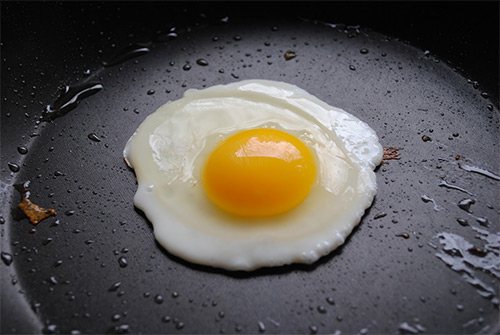
Eating fried eggs while breastfeeding should be done with caution.
Young mothers are often interested in the question: is it possible to take fried eggs during breastfeeding? The question is quite logical, because fried foods contain fats and cholesterol, and also cause heaviness in the stomach and heartburn.
You can eat fried eggs, but do it with extreme caution and no less than 4 months after birth, carefully monitoring the baby’s reaction.
The best options for fried foods for breastfeeding are:
- Scrambled eggs cooked in a slow cooker;
- Steamed fried egg;
- A dish cooked in a non-stick frying pan without oil;
- Scrambled eggs in a double boiler.
Whether it is possible to eat scrambled or fried eggs while breastfeeding - each mother decides for herself, based on the baby’s reaction. In any case, you should not abuse this product.
What eggs should you not eat during breastfeeding?
In order to avoid various gastrointestinal infections and disorders, the following types of eggs should not be consumed:
- Duck;
- Raw;
- Goose;
- Turkey;
- Stale.
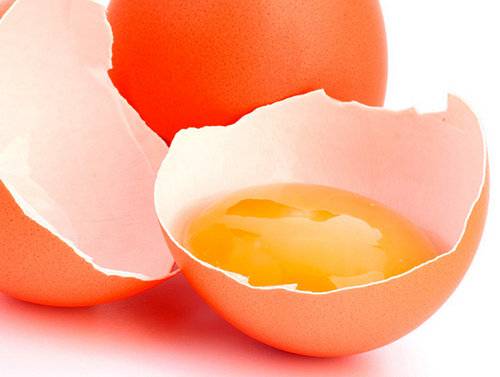
You should not eat raw eggs while breastfeeding.
In what cases should you not use it at all?
It is necessary to stop using the product in the following cases:
- If a negative reaction occurs in the baby (allergies, rash, nausea, bad stool);
- It is forbidden to take them raw, as the substances they contain can cause an intestinal infection;
- Eating shells is not recommended;
- Deep frying with high oil content should be avoided.
The harm of scrambled eggs
We list the main dangers that ordinary eggs can pose:
- Salmonellosis. A dangerous infectious disease transmitted through chicken droppings. Raw eggs can become a source of infection. Therefore, it is important to process them thermally, even with partial loss of useful substances, and also to wash them thoroughly before cooking and keep your hands clean. There is an opinion that quails do not suffer from salmonellosis, so their testicles can be eaten raw without fear. But actually it is not. Any bird is a potential carrier of salmonellosis.
- Eggs contain harmful cholesterol, which settles inside our blood vessels. It disrupts the normal functioning of the cardiovascular system. From this point of view, fried foods, such as scrambled eggs, are especially dangerous. The bulk of cholesterol is found in the yolk.
- Chickens that are raised in a poultry farm are fed industrial feed, which often contains large quantities of antibiotics, hormonal drugs, nitrates and other dangerous chemicals. All this turns out to be in eggs.
- Eggs are a highly allergenic product. This is due to the content of specific proteins in it. The reaction to them can manifest itself as skin rashes, digestive disorders, rhinitis and even Quincke's edema.
Rules of use
The presence of eggs in the diet of a nursing woman is justified subject to the following rules:
- Avoid consuming the product raw. This leads to intestinal and blood diseases;
- It is necessary to wash the eggs thoroughly before cooking;
- Introduce egg products no earlier than a month after birth and gradually;
- When starting to take it, cook for at least 10 minutes;
- It is recommended to start using the yolk.

Be sure to wash eggs before cooking.
Recommendations for product introduction
It is recommended to introduce eggs into the diet subject to the following rules:
- Start with a cooked product and only then move on to other cooking methods;
- First try 1/3 of the yolk, then the white;
- Introduce the product only a month after the birth of the baby;
- Avoid eating shells at first.
How many eggs can a young mother take?
Provided there are no negative reactions in mother and baby, subject to the rules of use, the recommended dose is 1 chicken per day or 4 quail.
It is recommended to take no more than 2 chicken and 8 quail eggs per week.
How to cook
Special attention should be paid to preparing egg dishes during lactation. After all, the health of mother and baby is affected not only by the product itself, but also by high-quality processing.
The following rules must be followed:
- Wash the product thoroughly before cooking;
- Preference should be given to boiled or steamed types of product rather than omelette;
- It is recommended to cook chicken for at least 10 minutes and quail for 3 minutes. It is also not worth cooking longer, as the product loses its beneficial properties;
- Omelette and fried eggs can be consumed, but in limited quantities and when using a non-stick coating. You should not add oil during cooking. It is best to cook it steamed or in a slow cooker.
Can mom eat quail eggs?

There is a more dietary and safer analogue - quail eggs. The product is rich in vitamins:
- A – retinol;
- B1 – thiamine;
- B2 – riboflavin;
- B12 – cyanocobalamin.
When breastfeeding, quail eggs should be introduced into the diet gradually, starting with one piece, after boiling it for a minute. When your baby is one month old, you can try eating raw eggs.

Despite the fact that some experts recommend avoiding the use of chicken protein in the first months of a child’s life, this substance is necessary in the mother’s diet. An important menu item is boiled, fresh quail eggs - a source of easily digestible protein
To eliminate the possibility of your child developing an allergic reaction, it is important to make sure that the product does not pose a potential danger. To do this, the mother just needs to undergo a special blood test, which will help determine the presence of an allergy to egg white.
Before heat treatment, the product must be washed; this measure is necessary to eliminate the possibility of salmonellosis infection.
When introducing a dish into the diet, you should carefully monitor your baby’s reaction. If you notice a rash, bloating, or colic, it is better to stop using it or reduce the portion.
Chicken eggs are recognized as the strongest allergen, while duck and goose eggs cause undesirable reactions to a lesser extent. In addition, they contain cholesterol, which is dangerous for the heart. All this must be remembered when creating a daily menu. The acceptable norm for a nursing mother, provided there are no allergic reactions in the baby, is two chicken or eight quail eggs per week.
Egg dishes for nursing mothers
The menu of a nursing mother is often associated with strict restrictions, but this is not so. Meals should be varied and rich in nutrients to stimulate lactation and benefit mother and baby. Restrictions apply to frankly harmful and allergenic products.
Eggs are healthy and indispensable on the menu during breastfeeding. Dishes can be not only nutritious, but also tasty.
Poached

Cooking method:
- Boil water over low heat;
- Break 1 egg into a cup;
- Stir boiling water until a crater forms in the middle;
- Slowly pour the egg into the center of the funnel;
- Cook for about 3 minutes, then carefully remove and place under ice water.
Can be served as a separate dish for breakfast.
Light salad
You will need: lettuce leaves, 10 cherry tomatoes, 10 quail eggs, a tablespoon of olive oil, salt.
Cooking method:
- Wash the leaves well and place on a plate;
- Boil the eggs for 3 minutes and, cutting in half, place on top of the salad;
- Also cut the tomatoes and arrange them;
- Add olive oil and salt to taste. If desired, you can sprinkle a little herbs.
Omelette in the oven
You will need: 3 eggs, 50 ml of milk, a pinch of salt, herbs.
Cooking method:
- Beat eggs with milk and salt until smooth;
- Pre-grease the baking dish with a spoon of olive oil;
- Pour the egg mixture into the mold;
- Place the dish in the oven for 20 minutes at 150 degrees.
When serving, it is recommended to cut into portions, you can add vegetables.

Recipes for mothers during the lactation period
Wash eggshells before cooking. The main egg dish for a woman during lactation is boiled eggs: soft-boiled, in a bag, hard-boiled.
Cooking time (from the moment the water boils):
- soft-boiled – 2 minutes;
- in a bag – 4 minutes;
- hard-boiled – 7 minutes.
Fully cooked yolk and white eliminate the possibility of salmonellosis infection. Overcooked (over 7 minutes) lose their taste: the protein becomes compacted to the point of rubber.
Recipes for other egg dishes:
- Omelette. Pour 2 tablespoons of milk into the beaten egg products (4 pieces), add salt, stir, pour into a frying pan (with oil or non-stick coating). Cook for 15 minutes, covered, over low heat.
- Fried eggs. Prepare from any quantity of product over medium heat until the whites and yolks are completely cooked.
- Fried egg. Only the white is baked, the yolk remains raw.
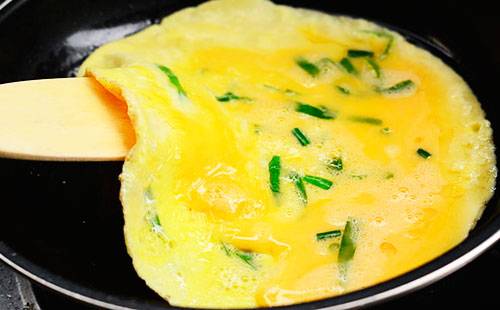
You can add vegetables, cheese, mushrooms, and sausage to the classic versions.
How to choose fresh quality eggs
There are several ways to choose a quality product:
- Place in a container with water. If they are on the bottom, blunt side up, then they are good to eat. If they are afloat or even on the surface, such a product should be disposed of immediately;
- It is recommended to look at the product in the light; no dark spots should be visible inside;
- Diet eggs are considered the freshest; they are marked “D” and are no older than one week;
- Large eggs contain more water than nutrients. Therefore, contrary to popular belief, it is better to give preference to small testicles.
Eating eggs while breastfeeding is not prohibited. This is a fairly healthy and nutritious product, but it should be taken rationally, using a high-quality product and correct preparation methods.





